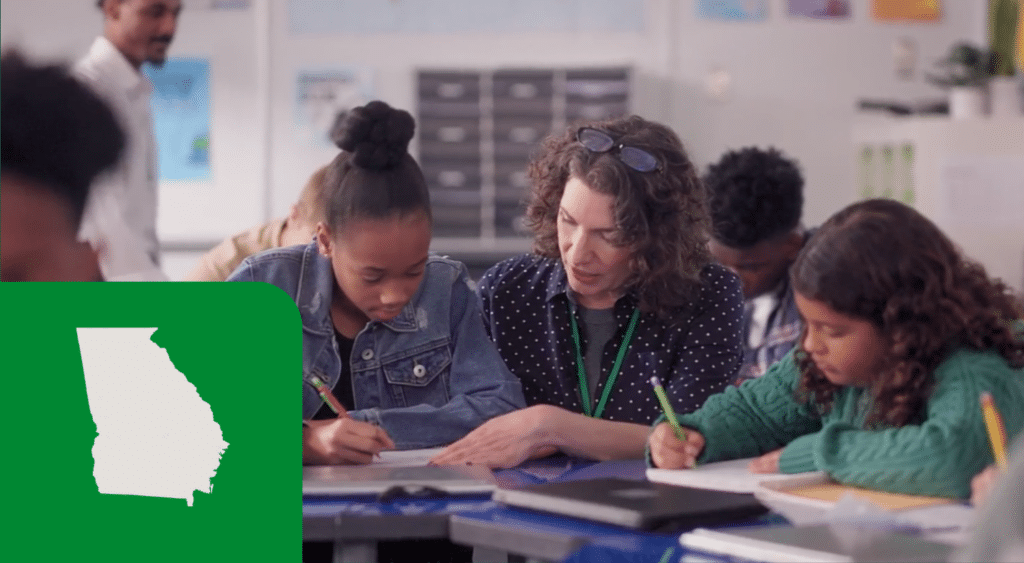How to become a paraprofessional in GA – Georgia!

To become a paraprofessional in GA, you’ll need to meet several requirements by the state of Georgia—including certification. In this role, you’ll provide essential support to students with special needs who have Individual Education Plans (IEPs)
Minimum Georgia state paraprofessional requirements, at a glance:
- Paraprofessional certification
- High school diploma or equivalent
- Background check and fingerprinting
- Health clearance
- Employment verification
In addition to Georgia state requirements, Kelly Education requires:
- Pre-hire training
- New hire orientation
At Kelly Education, we refer to this role as “paraeducator“. Much like a paramedic or paralegal, this reflects the professionalism of working in a particular field. Some school districts refer to this role by other names, like paraprofessional, teacher’s aide, or parapro.
A deeper dive into paraeducator requirements.
Kelly Education works with many school districts across Georgia to place paraeducators, so we know what it takes to get started. While the state doesn’t have a long list of requirements, the process can still take a little time, usually a few days to a few weeks.
How quickly things move depends on how soon you complete each step. Background checks and fingerprinting, in particular, can slow things down, so it’s helpful to get those going early.
Certification, licensing, authorization, and permits.
To become a paraprofessional in GA, you’re required to obtain a Georgia Paraprofessional License. You’ll need to have earned an associate degree or higher from an accredited university, or have completed at least two years (60 semester hours) of college coursework at an accredited university, or have a high school diploma and passing scores on the GACE (Georgia Assessments for the Certification of Educators) Paraprofessional Assessment.
Note that some school districts may require or prefer an associate or bachelor’s degree and may prefer to see coursework in education, social work, psychology, or another related field.
Education verification.
You’ll need to provide proof of your education to move forward with both earning your Georgia Paraprofessional License and getting a job as a paraprofessional. You may need to provide copies of your high school diploma or college coursework.
Experience.
There isn’t a specific experience requirement to work as a paraprofessional in Georgia. However, experience working with children, good communication skills, solid teamwork skills, and a history of positive problem-solving can all help a school district see that you could serve as an asset in the classroom.
Background screening and fingerprinting.
The state requires a background check through the Georgia Bureau of Investigation, and you’ll need to have your fingerprints taken so they can be placed on record. Of course, this is to make sure students have the safest environment.
Health screenings.
To work as a paraprofessional in Georgia, you’ll need to have a negative TB test result. This test can quickly and easily be performed in your doctor’s office. Some districts may require that you pass a physical examination, and you may be required to provide your immunization records.
Training.
Per the Individuals with Disabilities Education Act (IDEA), a federal law, paraprofessionals must receive appropriate training if they work with students who have special needs. Many school districts will offer training during the hiring process to help you understand best practices that can set you up for success in the classroom.
While it may not be required, it’s a good idea to take CPR and first aid training to ensure that you’re prepared for emergencies that may arise in the classroom. Many school districts cover the cost of this training. If you need to pay for training on your own, it usually costs about $50.
Kelly Education paraprofessional candidates are required to complete our ParaSmarts course. You’ll learn more about best practices and role-specific duties. Once hired, you’ll also attend a one-hour, online New Hire Orientation where you’ll learn about Kelly Education policies and your school district’s specific regulations.
Employment verification.
Before starting your work as a paraprofessional, you must prove eligibility to work in the United States. To complete this step, you’ll submit an I-9 form with valid identification credentials. This form can be completed in just a few minutes.
Again, if you work with Kelly Education, our team will help you with this. If working for a district, you’ll typically work on this with the human resources team.
Become a substitute paraprofessional in GA with Kelly Education.
Are you ready to get started with becoming a paraprofessional in GA? If you or someone you know is interested in paraprofessional or substitute teaching jobs, fill out our brief interest form, and one of our recruiters will contact you to answer your questions.
We also have an entire library of helpful articles for paraprofessionals and school educators. Some of the resources we have available include:
- What is a paraprofessional in schools
- Understanding IEP and 504 plans
- Paraeducator job description, duties, and responsibilities
*Information subject to change. This is a general guideline as of July 2025. School districts may have additional requirements in addition to state requirements.
View Related: Applying for jobs Article Job searching
You might like
Education Hiring Event – St. John the Baptist Parish Public District
1 minute read
Nov. 13 | St. John the Baptist Parish, LA
Education Hiring Event – West Baton Rouge Parish
< 1 minute read
Nov. 19 | West Baton Rouge Parish, LA
Education Hiring Event – Aurora Public Schools
< 1 minute read
Nov. 11 | Aurora, Colorado
Education Hiring Event – St. John the Baptist Parish Public District
1 minute read
Nov. 13 | St. John the Baptist Parish, LA
Education Hiring Event – West Baton Rouge Parish
< 1 minute read
Nov. 19 | West Baton Rouge Parish, LA
Education Hiring Event – Aurora Public Schools
< 1 minute read
Nov. 11 | Aurora, Colorado
Find your next job
Discover thousands of temporary, full-time, and remote jobs for beginning and experienced job seekers.



